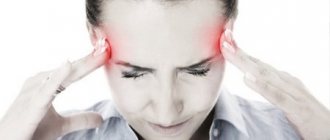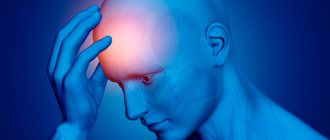Headache medications you can take during pregnancy
Antispasmodics
Often the cause of pain can be a spasm of blood vessels in the brain, neck muscles or the back of the head.
In such cases, products that contain substances that relax the walls of blood vessels are effective. Due to this, the diameter of the vessels increases and blood circulation is normalized.
It is important to know that this group of drugs is effective for tension headaches.
Antispasmodics are the safest group of painkillers during pregnancy.
“No-spa” (“Drotaverine”) is a drug that helps relax smooth muscle cells. This drug affects not only the walls of blood vessels, but also the cells of the intestines, biliary system, urinary system, and uterus. It is for this reason that “No-spa” is successfully used during pregnancy with increased uterine tone.
Thanks to numerous studies, it has been revealed that this medicine does not have a negative effect on the fetus and does not cause developmental defects.
Application should be in acceptable therapeutic doses, since exceeding the dosage may lead to side effects:
- Decreased blood pressure (to the point of fainting).
- Heart rhythm disturbances (increased heart rate).
- The emergence of a tendency to constipation (due to decreased intestinal motility).
Contraindications for use are individual sensitivity to the active substance, hypotension from 90/60 mmHg. and below, tachycardia from 110 beats/min.
Combined antispasmodic analgesics, which in addition to the antispasmodic component contain another active ingredient - an analgesic, are prohibited for use during pregnancy. Such drugs include “Spazmalgon”, “Andipal”.
Medicines that lower blood pressure
One of the causes of headaches is increased blood pressure. For pregnant women, this situation is most relevant for a number of reasons:
- an increase in circulating blood volume during gestation by almost 40%;
- the development of gestosis, which is characterized by increased pressure, as well as fluid retention in the body;
- increased load on the cardiovascular system;
- exacerbation of existing chronic kidney and heart diseases.
Increased pressure is manifested by pain, most pronounced in the occipital region. There may be a feeling of heaviness in the head, flashing “spots before the eyes.”
Among the approved centrally acting antihypertensive drugs, they include (“Dopegit”) and a solution of “Magnesium sulfate” (“Magnesia”).
"Dopegit" acts on alpha-adrenergic receptors located in the brain.
It can be used during pregnancy for a number of reasons:
- There is no negative effect on fetal development.
- Adequate uteroplacental blood flow is maintained.
"Magnesia". When a pregnant woman experiences a headache associated with high blood pressure, the Magnesium sulfate solution is highly effective. In addition, it is a tocolytic (reduces the tone of the uterus), promotes the removal of fluid from the body (with edema).
This medicine is successfully used in obstetrics; it is especially necessary if a pregnant woman has gestosis, as it affects many parts of the pathogenesis.
The main route of administration is intravenous infusion, less often intramuscularly.
If necessary, tablet magnesium preparations (Magnerot, Magnelis, Magne-B6) are prescribed. Their effect appears gradually, the duration of therapy ranges from 10 to 30 days.
Preparations based on paracetamol
This group of medications can relieve pain of moderate intensity without harming the condition of the fetus.
The drug penetrates the placental barrier, but according to studies, Paracetamol does not have a toxic or teratogenic effect (does not cause developmental abnormalities) on the fetus. It should be remembered that the use of this drug should be limited.
Analogues of Paracetamol are Panadol, Efferalgan.
Types of headaches
Headaches during pregnancy can be independent or occur against the background of other pathological processes, acting as their symptomatic manifestations. The most common types of headaches are:
- Migraine – characterized by pain of a long-term, severe, painful nature. Typically, such pain syndromes are considered hereditary, but the causes can be different. A characteristic difference of this condition is the duration of the painful symptoms; the girl has a headache for several days, accompanied by nausea and vomiting reactions. In hypersensitive mothers, headaches during pregnancy may appear due to stress, etc.
- Voltages. This type of headache usually occurs due to overwork, stress, or heavy exertion during pregnancy. Such painful sensations are usually localized in the occipital and frontal areas, and when intensified, they spread to the shoulders and cervical region. But their duration is usually short.
- Beam or cluster - occurs in pregnant women against the background of dilatation of the orbital arteries.
You should not be especially afraid of migraines during pregnancy; according to statistics, they are only in isolated cases a sign of serious pathologies. But you shouldn’t endure it, ignoring and triggering such sensations either.
What drugs are dangerous for pregnant women?
The group of non-steroidal anti-inflammatory drugs is not recommended for use during gestation. However, if your headache is very severe and other medications do not help, then you should adhere to the following rules:
- Avoid the use of analgin-based products as the most toxic of all drugs in this group.
- It is not recommended to take combined analgesics that contain several components that relieve pain. These include: “Pentalgin”, “Caffetin”, “Solpadeine”.
- It is better to give preference to medications with one active ingredient (preferably paracetamol-based).
- Try not to take two or more tablets in one day, and also avoid long-term use.
- If possible, avoid taking pills in the first trimester, when the formation of fetal organs and systems occurs.
Severe pain
If pregnancy is characterized by the presence of moderate pain, then this condition does not pose a danger. Severe pain during pregnancy deserves increased attention, which may indicate the development of serious pathologies such as meningitis or glaucoma, circulatory disorders in the brain and hypertension, kidney or spinal diseases, etc.
In the best case, severe pain accompanies stress and fatigue, and can occur against the background of irritants such as bright light or an overly strong smell. In any case, you need to tell the gynecologist about the problem so that he can choose the right treatment, if necessary. And treating headaches during pregnancy is extremely important, otherwise it can harm the patient.
Non-drug methods
Given the small choice of medications for relieving headaches during pregnancy, it is worth giving preference to alternative methods.
Massage
It has been proven that running your fingers from the frontal part of the head to the back of the head (in one direction only) helps eliminate stagnation of venous blood in the sinuses of the brain. This is explained by the presence of perforating veins on the surface of the head, which are connected to the venous sinuses.
Such a massage for 15 minutes can significantly reduce pain, even eliminating it completely.
For more information on how to get rid of headaches with massage, watch the video:
Neck massage
It is especially effective if your head hurts due to osteochondrosis of the cervical spine. After all, the vertebral arteries pass through the cervical region, compression of which can cause excruciating pain in the head.
Reflexology
Impact on certain points of our body leads to the activation of certain physiological processes. So, for headaches, light pressure on the temporal areas on both sides is effective; you can use light massaging movements in a clockwise direction.
Doctor's advice
Neck massage can only be done in the form of light pressure on the muscles, stroking, and in no case too much. Firstly, movements with intense pressure will cause muscle pain. Secondly, there is always the possibility of a hernia, massage in which is done very carefully.
Victoria Druzhikina Neurologist, Therapist
Pressing on the following points will help relieve headaches: at the base of the inner edge of both eyebrows, the center of the superciliary arches (the exit point of the supraorbital nerve), the middle of the bridge of the nose, the point between the base of the 1st and 2nd fingers of both hands. You need to gently press on each point for 2-3 minutes.
Drinking strong tea with sugar
It is effective to drink a cup of strong tea for headaches associated with low blood pressure. Coffee drinks should not be consumed during pregnancy, as caffeine can cause increased heart rate. Use caution in case of diabetes mellitus and gestational diabetes mellitus, which is common among pregnant women.
Normalization of the daily routine
If a pregnant woman often has headaches, she needs to adjust her daily routine. Normalizing sleep and rest is very important. For example, walking for 15 minutes before bed is very beneficial. Pain will become much less of a problem if you pay due attention to rest.
Taking a warm shower
Promotes relaxation and improves blood circulation in the body.
You should not get carried away with aromatherapy, as some essential oils can cause an allergic reaction.
There are currently at least 50 known reasons why a headache may occur. During pregnancy, the most common are tension headaches, as well as headaches that occur when pressure rises (for example, with severe gestosis).
Despite such a wide range of drugs available on the pharmacological market, during pregnancy their choice is extremely limited. Therefore, during the period of bearing a child, before taking this or that medicine, it is necessary to find out the cause of the headache.
Unsystematic use of pills can negatively affect the baby's development. We must not forget about the serious causes of headaches (vascular aneurysm, pathological tortuosity, space-occupying brain formations). A consultation with a gynecologist and therapist will help you understand the mechanisms of pain, as well as prescribe the necessary medication.
This article has been verified by a current qualified physician, Victoria Druzhikina, and can be considered a reliable source of information for site users.
Bibliography
1. https://www.mediasphera.ru/issues/zhurnal-nevrologii-i-psikhiatrii-im-ss-korsakova/2015/11/downloads/ru/591997-729820151118 2. https://journals.eco-vector .com/RFD/article/viewFile/1431/1051
Rate how helpful this article was
5 Voted by 1 person, average rating 5
Did you like the article? Save it to your wall so you don’t lose it!
Why does it hurt?
The causes of headaches can be very different. Let's try to highlight the most common ones.
- Unfavourable conditions
What are we talking about? If the room is stuffy, the air is stale, smells bad, there are strong odors (household chemicals, perfumes) - even a healthy man can get a headache, let alone pregnant women.
As a rule, in such a situation, it is enough to go out into the fresh air or thoroughly ventilate the room to feel much better.
- Disorders of the circulatory system and blood vessels
If you have to stay in the same position for a long time, especially an uncomfortable one, blood stagnation and vascular compression naturally occur.
Considering that in girls in this position, blood circulation increases (because now the body nourishes not only itself, but also the fetus), this condition is dangerous, and the resulting pain is a signal to the mother who is doing something wrong.
It is important to change your body position, get up, walk around, and gently stretch as often as possible, but definitely not less than every 30 minutes.
- Stress
Experiences and troubles in life, unfortunately, do not disappear anywhere with the appearance of a tummy. The hormone cortisol, which is released in stressful situations, can provoke headaches.
The rule about the need to be less nervous and know that very soon there will be nothing more important in your life than the lump that you carry under your heart applies here.
Everything else will fade into the background. Actually, you shouldn’t wait for this, but you should move it there now. Only by realizing that other problems are not worth your strong feelings can you keep your emotions under control and not allow yourself to become stressed.
- ARVI and colds
In this case, headache will not be the only symptom. It will be supplemented by a runny nose, cough, and general impairment. All these symptoms can be present either together or in various combinations.
- Migraine
Typically, this is a hereditary problem. It is characterized by regular headaches, often for no apparent reason, or due to changes in weather (sudden warming, sudden cold snap).
The risk of experiencing this trouble while expecting a baby is higher, the more often you had to deal with the scourge before pregnancy.
If a migraine is caused by low blood pressure, some experts advise the pregnant woman to drink a cup of ground coffee. However, of course, you should not abuse this drink.
First aid measures
After identifying the probable causes that provoked painful sensations in the head, it is necessary to select the safest method for eliminating them. Many mothers have absolutely no idea what pregnant women can do for headaches.
- First you need to create the most comfortable and favorable conditions for mommy.
- This includes every little thing. Dim the lighting, eliminate sources of harsh sounds and loud noise, wear something more comfortable so that nothing restricts your movements.
- It is useful to ventilate the room or go for a walk.
- In order to always feel excellent, mommy should not forget about proper nutrition and drinking regime.
- If the above manipulations did not help relieve headaches during pregnancy, then you can apply a cool compress to your head by wetting a towel with cold water. You need to keep this compress for at least half an hour.
- Another way to treat migraine ailments is a contrast or cool shower.
- Healthy sleep will help eliminate painful discomfort in the temples and other parts of the head.
- A joyful, optimistic attitude also helps reduce pain; you just need to protect yourself from stress and psycho-emotional experiences, dream about what your baby will be like, etc.
- If these methods refuse to relieve migraine pain, then it is recommended to massage the temples and other painful areas with circular and smooth movements. Such stroking significantly reduces the intensity of discomfort.
If, even after these manipulations, the unpleasant symptoms do not go away, then you can take the medications that we traditionally take for fever.
Folk remedies for migraines
Folk remedies for headaches during pregnancy are also very common among patients. This approach to therapy is considered a safer, but at the same time quite effective method of combating migraine sensations.
Sometimes traditional medicine is the only thing that helps a woman and that she can drink in a similar situation. Often, such therapy is based on herbal treatment at home, the use of healing mud, etc.
Herbal medicine or herbal medicine
You need to talk to your doctor about your grandmother's recipes.
Treatment with folk remedies is not complete without the use of medicinal herbs. Herbal decoctions are useful. For example, a mixture of sage, rosemary and thyme. All herbs are taken in a large spoon and steamed with a glass of boiling water, kept under the lid for about 10 minutes, filtered. The infusion should be consumed warm.
The following mixture also helps with painful headaches: mint and valerian roots, calendula and St. John's wort, strawberry leaves. Take all the ingredients in a large spoon, pour boiling water (1 liter), boil for 10 minutes and drink a glass a day.
Cinnamon tincture helps relieve severe pain. Take a gram of seasoning and steam it with boiling water for half an hour. The drug can be used by adding honey to it. Drink in small sips. Judging by the reviews, the remedy is effective; you drink it and there is no trace of pain left.
Mud therapy
Many doctors recommend that pregnant girls treat migraines without using medications. Clay and mud therapy can be an excellent and safe alternative. To effectively eliminate the problem, it is recommended to mix the clay with mint infusion. In this case, the mixture must be very thick so that it can be molded into a cake to be applied to the head.
A similar principle is used for treatment with mud, which is diluted with medicinal solutions such as infusions of lemon balm or lemon, garlic or menthol, vinegar, etc.











